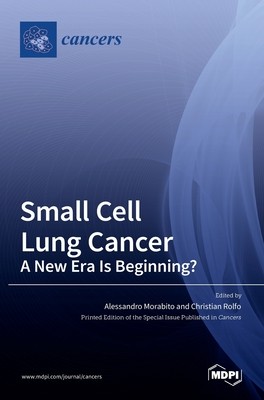
- We will send in 10–14 business days.
- Publisher: MDPI AG
- ISBN-10: 3036523014
- ISBN-13: 9783036523019
- Format: 17 x 24.4 x 1.4 cm, hardcover
- Language: English
- SAVE -10% with code: EXTRA
Small Cell Lung Cancer (e-book) (used book) | bookbook.eu
Reviews
Description
Small-cell lung cancer (SCLC) is the most aggressive form of lung cancer: No significant progress has been made in finding new treatments for decades and platinum-based chemotherapy has for a long time represented the standard of care. This therapeutic scenario has recently changed, thanks to positive results in terms of improvement of overall survival obtained with a combination of checkpoint inhibitors (atezolizumab or durvalumab) with platinum-etoposide in patients with extensive disease. Moreover, nivolumab and pembrolizumab showed antitumor activity and received U.S. FDA approval as single agents in patients pretreated with platinum-based therapy and at least one other therapy. The improvement in the knowledge of the biology of SCLC has led to the development of new experimental therapies that have shown promising results, including poly (ADP-ribose) polymerase (PARP) inhibitors, anti-Notch ligand Delta-like protein 3 (anti-DLL3), antibody-drug conjugates, and aurora kinase inhibitors. Future challenges are the identification of predictive biomarkers for immunotherapy, the definition of the role of new biological agents, and the improvement of integrated approached for limited disease. This Special Issue will highlight the current state of treatment of extensive SCLC, focusing on the biology of SCLC, immune-checkpoint inhibitors, PARP inhibitors, and novel cytotoxic chemotherapy and radiotherapy techniques.
EXTRA 10 % discount with code: EXTRA
The promotion ends in 16d.18:58:27
The discount code is valid when purchasing from 10 €. Discounts do not stack.
- Publisher: MDPI AG
- ISBN-10: 3036523014
- ISBN-13: 9783036523019
- Format: 17 x 24.4 x 1.4 cm, hardcover
- Language: English English
Small-cell lung cancer (SCLC) is the most aggressive form of lung cancer: No significant progress has been made in finding new treatments for decades and platinum-based chemotherapy has for a long time represented the standard of care. This therapeutic scenario has recently changed, thanks to positive results in terms of improvement of overall survival obtained with a combination of checkpoint inhibitors (atezolizumab or durvalumab) with platinum-etoposide in patients with extensive disease. Moreover, nivolumab and pembrolizumab showed antitumor activity and received U.S. FDA approval as single agents in patients pretreated with platinum-based therapy and at least one other therapy. The improvement in the knowledge of the biology of SCLC has led to the development of new experimental therapies that have shown promising results, including poly (ADP-ribose) polymerase (PARP) inhibitors, anti-Notch ligand Delta-like protein 3 (anti-DLL3), antibody-drug conjugates, and aurora kinase inhibitors. Future challenges are the identification of predictive biomarkers for immunotherapy, the definition of the role of new biological agents, and the improvement of integrated approached for limited disease. This Special Issue will highlight the current state of treatment of extensive SCLC, focusing on the biology of SCLC, immune-checkpoint inhibitors, PARP inhibitors, and novel cytotoxic chemotherapy and radiotherapy techniques.


Reviews